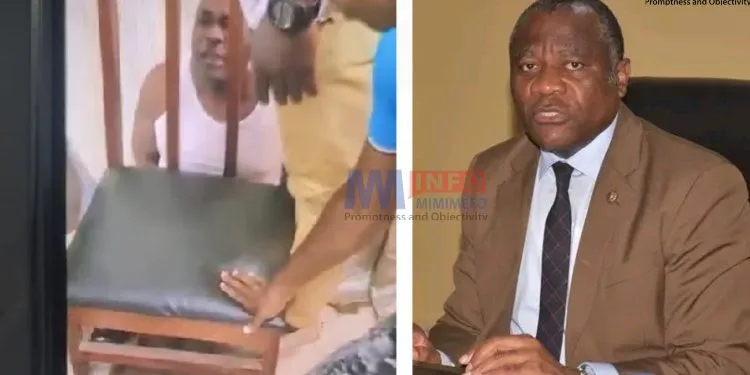The Cameroon Human Rights Commission has maintained stoic silence following the release of a shocking video showing the brutal torture of popular artist Longue Longue at the hands of security forces. Despite the commission’s mandate to protect citizens’ rights and prevent torture, it has not issued a single statement addressing this violation, which has sparked outrage across the nation.
The viral video captures Longue Longue, a renowned musician, enduring violent torture at the hands of several members of SEMIL, a branch of the Cameroonian security forces in Douala. The footage shows the artist forced under a chair and enduring severe abuse, including an attack with a machete.
Human Rights Commission Remains Silent
The Cameroon Human Rights Commission, under the direction of Prof. James Mouangue Kobila, remains conspicuously silent as public outrage grows. This lack of response is drawing criticism, particularly given the commission’s recent assurances to international delegations about its commitment to human rights. On Friday, October 18, just days before the video surfaced, the commission reassured a visiting U.S. delegation of its dedication to protecting human rights and preventing torture.
“Before, the National Human Rights Institution of Cameroon had two mandates: the promotion and protection of human rights. Today, the Commission has a third mandate, which is the prevention of torture in all places of deprivation of liberty throughout the national territory. And as such, the CDHC serves as the National Mechanism for the Prevention of Torture,” Prof. Kobila told the U.S. Deputy Ambassador to Cameroon, John Robinson, during a meeting at the commission’s Yaoundé office.
Commitments Contradicted by Inaction
Yet, despite these bold declarations, the commission has not publicly condemned the brutal treatment of Longue Longue. Its silence is particularly troubling, given that Prof. Kobila had highlighted the commission’s role in working closely with international organisations to address human rights issues in Cameroon. He also noted that the institution was preparing to submit an Alternative Report to the United Nations Committee against Torture as part of the state’s 6th Periodic Report on human rights.
Pattern of Silence on State-Backed Violations
The commission’s apparent inaction is not unprecedented. Observers have noted a pattern of non-response when state forces are accused of committing atrocities. Critics point out that while the commission claims to submit annual reports on the state of human rights and prevention of torture, it has rarely, if ever, directly condemned security forces for human rights abuses.
Human rights advocates argue that the commission’s silence in the face of such blatant violations undermines its credibility. One activist, speaking anonymously, said: “The commission is quick to talk about its mandates and the reports it submits, but where is the action? The torture of Longue Longue is not just an attack on one man; it is an attack on the human rights of all Cameroonians.”
A Question of Accountability
Despite the claims of transparency and accountability, a review of the commission’s public statements reveals a lack of condemnation or accountability for the frequent human rights abuses reported across the country. The case of Longue Longue is just the latest example of the commission’s reluctance to hold security forces accountable for their actions.
The public waits for a response, and the silence of the Cameroon Human Rights Commission grows increasingly deafening, raising questions about its commitment to protecting the rights it was established to defend.



